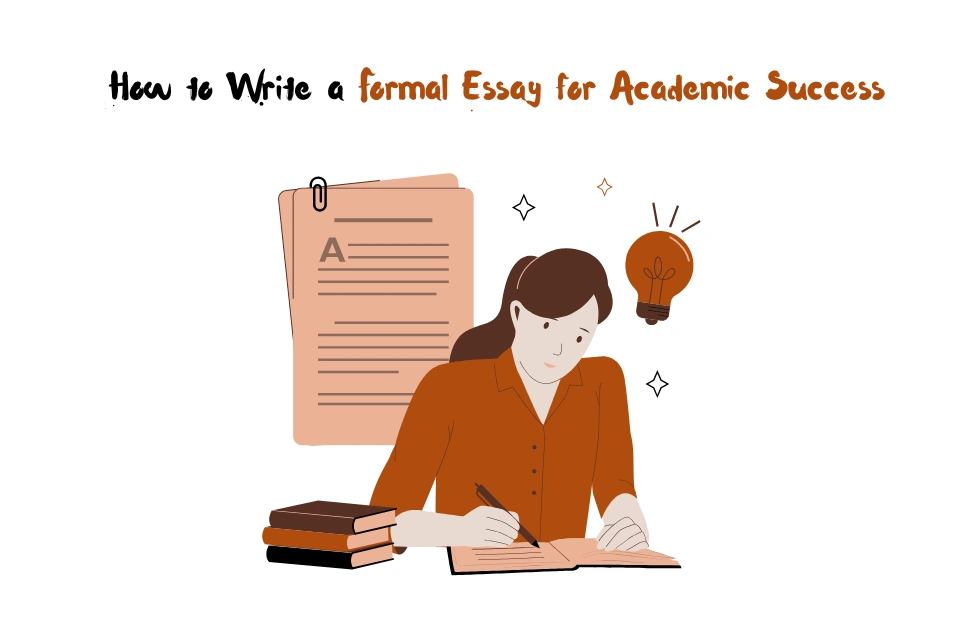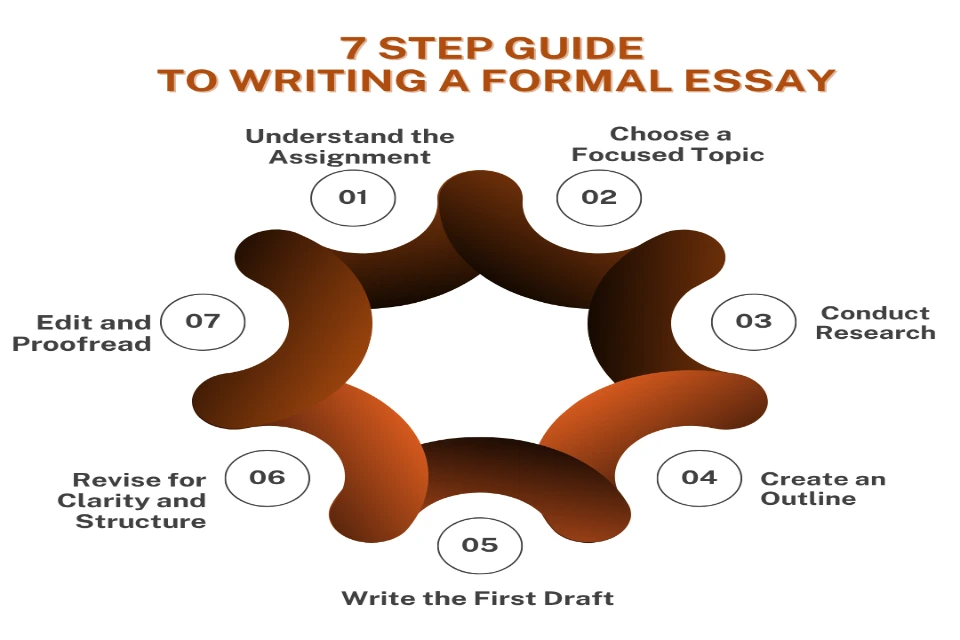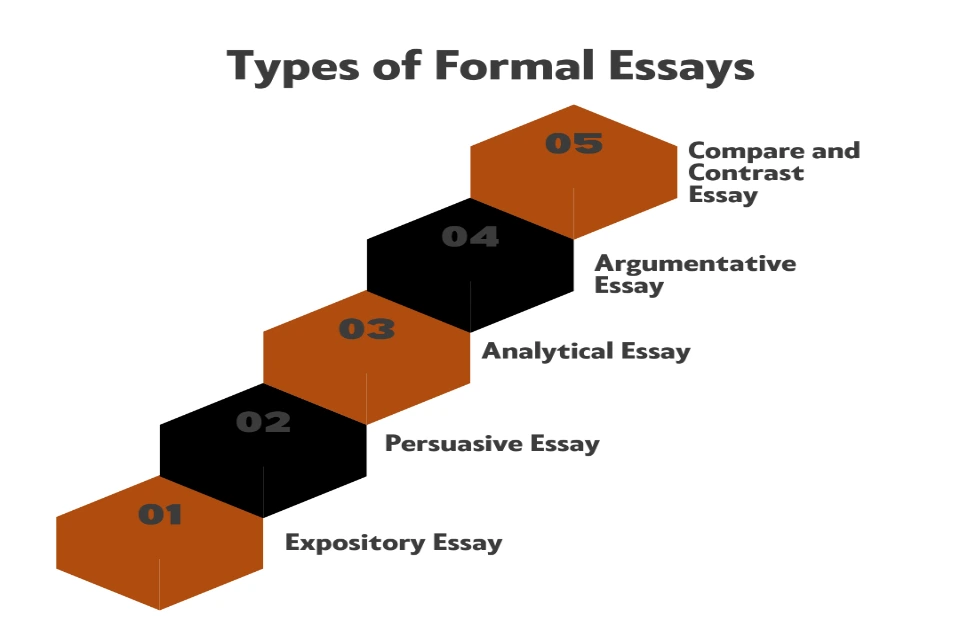
A formal essay is a structured, third-person piece of academic writing that focuses on factual information and logical arguments. It requires logical organization, strong arguments, and a confident tone — all skills that can be developed with practice.
Studies from the National Assessment of Educational Progress show that over 80% of high school and college-level writing assignments are formal in nature. Moreover, strong formal writing skills contribute to 15–20% higher scores on tests measuring critical thinking and communication.
In this comprehensive guide, we’ll walk you through everything you need to know about writing a formal essay: from structure and tone to formatting rules and examples.
What Is a Formal Essay?
A formal essay is a type of academic writing that presents a clear, structured argument on a specific topic. It typically follows a formal tone, avoids contractions and colloquialisms, and relies on evidence-based analysis. Formal essays are commonly used in literature, history, science, social studies, and other disciplines that value analytical thinking and logical structure.
Key Differences: Formal vs. Informal Essays
While both formal and informal essays are written forms of expression, they differ significantly in tone, purpose, structure, and language. The key distinctions between the two styles are:
| Element | Informal Essay | Formal Essay |
|---|---|---|
| Tone | Conversational, expressive | Neutral, academic |
| Pronouns | First- and second-person (I, you) | Third-person only |
| Purpose | To entertain or share personal views | To analyze, argue, or explain |
| Structure | Loosely structured | Organized with clear thesis and flow |
| Language | Slang, colloquialisms | Formal, academic vocabulary |
| Thesis | May be vague or absent | Clearly stated in the introduction |
7 Step Guide to Writing a Formal Essay
Writing a formal essay becomes much easier when you follow a clear process. Each step builds on the previous one, helping you create a polished and effective piece of academic writing.

Step 1: Understand the Assignment
Before you begin writing, take time to carefully read the assignment prompt. Make sure you understand what kind of essay is required: analytical, argumentative, or expository.
Note any word count limits, formatting styles (like APA or MLA), and deadlines. Also, consider who your audience is and what they expect from your writing.
Step 2: Choose a Focused Topic
Pick a topic that fits the assignment and is specific enough to cover within the required word count. Broad topics can be overwhelming, while narrow ones are easier to manage.
Make sure the topic is something you can research and build a strong argument around. If you’re unsure, check with your instructor.
Step 3: Conduct Research
Use trusted sources like academic journals, books, and reputable websites to gather information. Take notes as you read and keep track of where your information comes from.
Good research strengthens your credibility and supports your thesis with real evidence. Always aim to include facts, data, and expert opinions.
Step 4: Create an Outline
Before you start writing, plan your essay’s structure. Begin with an introduction that includes your thesis. Follow with body paragraphs that each discuss one main idea.
Finish with a conclusion that wraps up your argument and leaves a final impression. An outline keeps your writing organized and focused.
Step 5: Write the First Draft
Now it’s time to turn your outline into a full essay. Write your introduction first, leading up to your thesis statement. Then, develop each body paragraph with examples and explanations.
Don’t worry about perfection in this draft; just focus on getting your ideas down clearly and logically.
Step 6: Revise for Clarity and Structure
After writing your draft, review it with a critical eye. Make sure your ideas flow smoothly from one paragraph to the next and that each point supports your thesis.
Look for unclear sentences, weak transitions, or any parts that don’t add value. You can also ask someone else to review it and offer feedback.
Step 7: Edit and Proofread
The final step is editing your essay for grammar, punctuation, and spelling. Remove any informal language or vague words.
Double-check your citations and format according to the required style guide. A clean, error-free essay shows professionalism and attention to detail.
Formal Essay Example
Title: The Importance of Renewable Energy in Combating Climate Change
Introduction:
Climate change is one of the most pressing global issues of the 21st century. As greenhouse gas emissions continue to rise, the need for clean and sustainable energy sources becomes increasingly urgent. This essay argues that transitioning to renewable energy is essential for mitigating climate change and ensuring long-term environmental sustainability.
Body Paragraph 1:
Renewable energy sources, such as solar and wind, produce little to no greenhouse gas emissions. According to the International Energy Agency, solar photovoltaic systems can reduce carbon dioxide emissions by up to 90% compared to fossil fuels. Furthermore, renewable energy is becoming more economically viable. As technology advances and production scales up, the cost of clean energy continues to decline, making it a competitive alternative to coal and oil.
Body Paragraph 2:
Another critical advantage of renewable energy is its role in enhancing energy security and independence. Countries that rely heavily on imported fossil fuels are vulnerable to global market fluctuations and geopolitical conflicts. By investing in locally produced renewable energy, such as wind farms and solar arrays, nations can reduce their dependence on foreign oil and gas. This not only stabilizes energy prices but also promotes national security by reducing exposure to supply disruptions.
Body Paragraph 3:
In addition to environmental and economic benefits, renewable energy also creates substantial employment opportunities. According to a report by the International Renewable Energy Agency (IRENA), the renewable energy sector employed over 12 million people globally in 2022, a number expected to grow significantly in the coming years. These jobs span manufacturing, installation, maintenance, and research and development. As traditional energy sectors decline, renewables offer a sustainable pathway for job creation and economic resilience.
Conclusion:
In conclusion, investing in renewable energy is not only environmentally responsible but also economically strategic. From reducing emissions and enhancing energy security to generating employment and supporting sustainable development, the transition to clean energy presents a comprehensive solution to climate change. Governments and businesses must prioritize clean energy to combat climate change and protect future generations.
Formal Essay Writing Rules
Do:
- Use objective, academic language.
- Ensure clarity and precision.
- Cite all sources properly (MLA or APA).
- Maintain a logical flow throughout.
Don’t:
- Use “I,” “we,” or “you.”
- Include slang or conversational phrases.
- Use contractions (e.g., write “do not” instead of “don’t”).
- Overuse passive voice.
Formatting Guidelines
Most formal essays follow MLA or APA style. Here's a quick reference:
MLA Format
- Top left: Your name, instructor, course, date
- Title centered
- Page number + last name in top right corner
APA Format
- Separate title page
- Bold, centered title
- Author, course, instructor, date below title
- Page number in top right
General Formatting (Both Styles):
- Font: Times New Roman, 12 pt
- Spacing: Double-spaced
- Margins: 1-inch all around
- Paragraph Indent: 0.5 inch
- Align: Left-justified
Types of Formal Essays
Formal essays serve different academic and communicative purposes. Understanding the distinctions between each type helps you choose the best format for your topic and goal. Here are the five most common types of formal essays:

1.Expository Essay
An expository essay aims to explain a topic in a clear, objective, and straightforward manner. It presents factual information without personal opinions or emotional language. Writers use examples, data, and definitions to inform or clarify a subject for the reader.
This type of essay is commonly assigned in school exams and research assignments where the main goal is to educate or inform rather than to argue.
Example Topic: The impact of climate change on polar bears
2. Persuasive Essay
The purpose of a persuasive essay is to convince the reader to adopt a particular point of view or take a specific action. It combines logic and reasoning with emotional appeal to make a compelling case.
Writers use rhetorical devices, strong evidence, and persuasive language to sway the reader’s opinion. This type of essay is often used in speeches, opinion pieces, and debates.
Example Topic: Why the voting age should be lowered to 16
3. Analytical Essay
An analytical essay examines a subject such as a text, event, or idea by breaking it down into its individual parts and exploring how those parts work together. The focus is on interpretation, not just summary.
This type of essay is often used in literature, film, and historical analysis. It requires critical thinking and a strong thesis supported by textual evidence or real-world examples.
Example Topic: Analyzing the symbolism in George Orwell’s Animal Farm
4. Argumentative Essay
An argumentative essay makes a claim and supports it with logical reasoning and credible evidence. While similar to a persuasive essay, it is typically more formal and grounded in factual, research-based content rather than emotional appeal.
Writers are expected to present both sides of the issue and explain why their position is stronger. Argumentative essays are common in academic and policy writing.
Example Topic: The case for universal healthcare
5. Compare and Contrast Essay
This type of essay analyzes the similarities and differences between two or more subjects. It helps readers understand the relationship between ideas, objects, or concepts, often leading to deeper insights.
You can organize this essay by discussing one subject at a time or by using a point-by-point structure. It’s especially useful in subjects like literature, history, and social sciences.
Example Topic: Comparing online learning with traditional classroom education
Formal Essay Topic Ideas
Choosing the right topic is the first step toward writing a compelling formal essay; here are some ideas to inspire and guide your writing.
- The long-term effects of global warming
- Should genetic engineering be regulated?
- The pros and cons of renewable energy
- How space exploration benefits humanity
- Should animal testing be banned in science?
- The environmental impact of plastic pollution
- The ethics of cloning humans or animals
- How artificial intelligence is transforming healthcare
- Nuclear energy: Solution or risk?
- The role of science in combating pandemics
- The environmental cost of global tourism
- Impacts of caffeine on cognitive performance
- The impact of standardized testing on student learning
- Should school uniforms be mandatory?
- Online vs. in-person learning: Which is more effective?
- Should students be taught financial literacy in school?
- The benefits of learning a second language early
- Is homework still relevant in today’s education system?
- How inclusive education supports learning diversity
- Should physical education be mandatory in high schools?
- The influence of technology on classroom performance
- Why arts education is essential in schools
- Can punishment improve classroom behavior?
- Comparing online vs. on-campus college experiences
- Should voting be mandatory in democracies?
- The impact of social media on political campaigns
- Is democracy the best form of government?
- The role of government in regulating the internet
- Should there be term limits for all politicians?
- How corruption affects developing countries
- The balance between national security and individual privacy
- Should the United Nations have more power?
- Is freedom of speech under threat today?
- The effectiveness of international sanctions
- Should euthanasia be legalized?
- The social impact of income inequality
- Is capital punishment morally acceptable?
- Should the rich be taxed more heavily?
- The influence of consumer culture on modern society
- Are beauty standards harmful to mental health?
- Should there be universal basic income?
- The rise of cancel culture and its consequences
- Should advertising to children be restricted?
- The ethical challenges of facial recognition technology
- Are early marriages beneficial or harmful?
- The role of mindset in academic success
- How social media affects self-esteem
- Should mental health days be allowed in schools?
- The link between childhood trauma and adult behavior
- Is emotional intelligence more important than IQ?
- The psychological impact of working from home
- How peer pressure influences decision-making
- The effects of sleep deprivation on cognitive performance
- Why goal setting improves motivation and focus
- The impact of loneliness on mental and physical health
- Mental health awareness in sports
- How technology is reshaping childhood development
- Benefits of reading fiction for emotional intelligence
A formal essay is more than just following a set of rules; it's about developing a clear, reasoned argument, presenting ideas in a logical structure, and maintaining a tone that reflects academic credibility.
When You’re Stuck, Guidance Makes All the Difference
Writing a formal essay doesn't have to be intimidating. Once you understand the format, rules, and tone, it becomes much easier to construct compelling and coherent arguments. Stick to the guidelines above, practice regularly, and you’ll be on your way to mastering this foundational academic skill.
At Writeessaytoday, we specialize in delivering high-quality, custom-written formal essays tailored to your assignment requirements. Our team of experienced academic writers understands what it takes to craft essays that are not only well-structured and properly formatted but also insightful and impactful.
So whether you need help brainstorming ideas, polishing your argument, or writing the entire essay from scratch, Writeessaytoday is your trusted academic partner.




